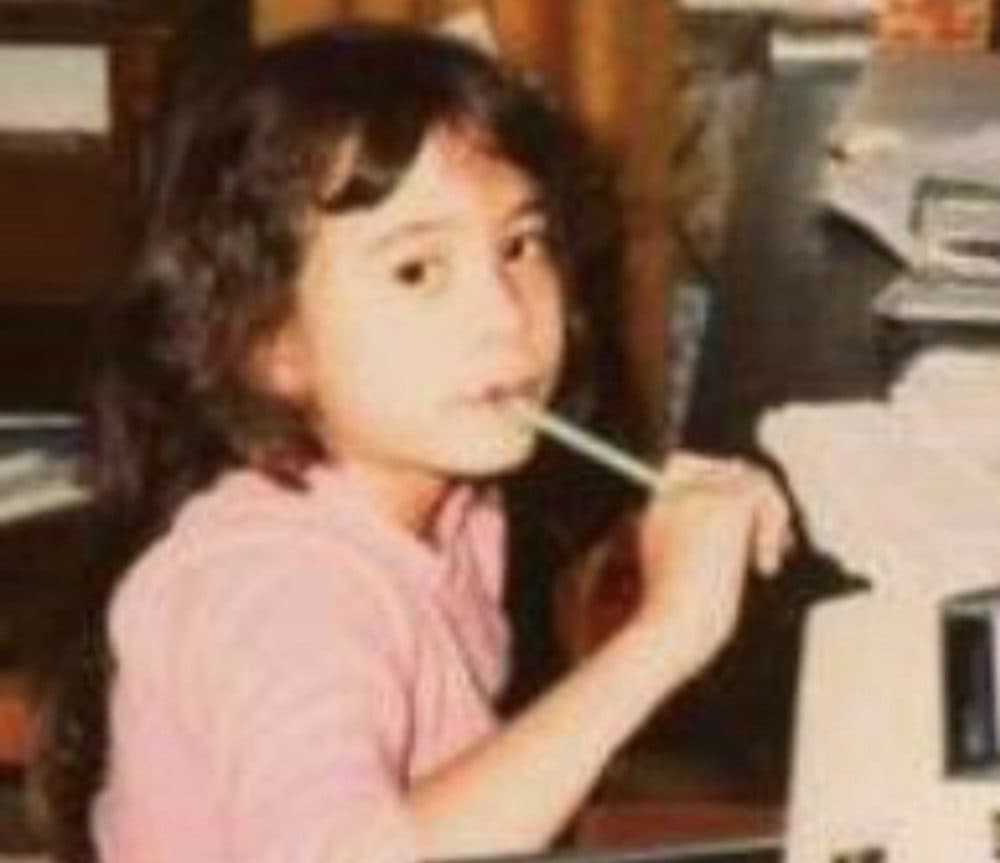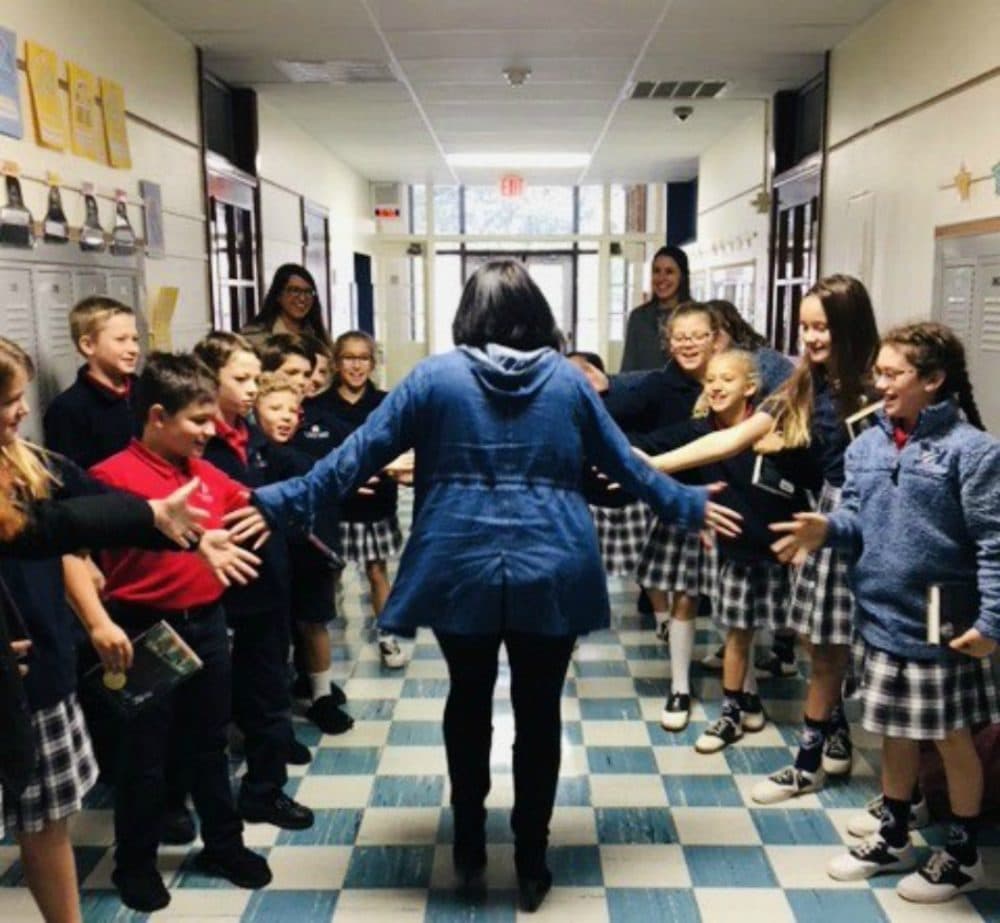Advertisement
5 Questions With
‘Imagination And Creativity Can Carry You Through’: A Conversation With Newbery Medal Winner Erin Entrada Kelly
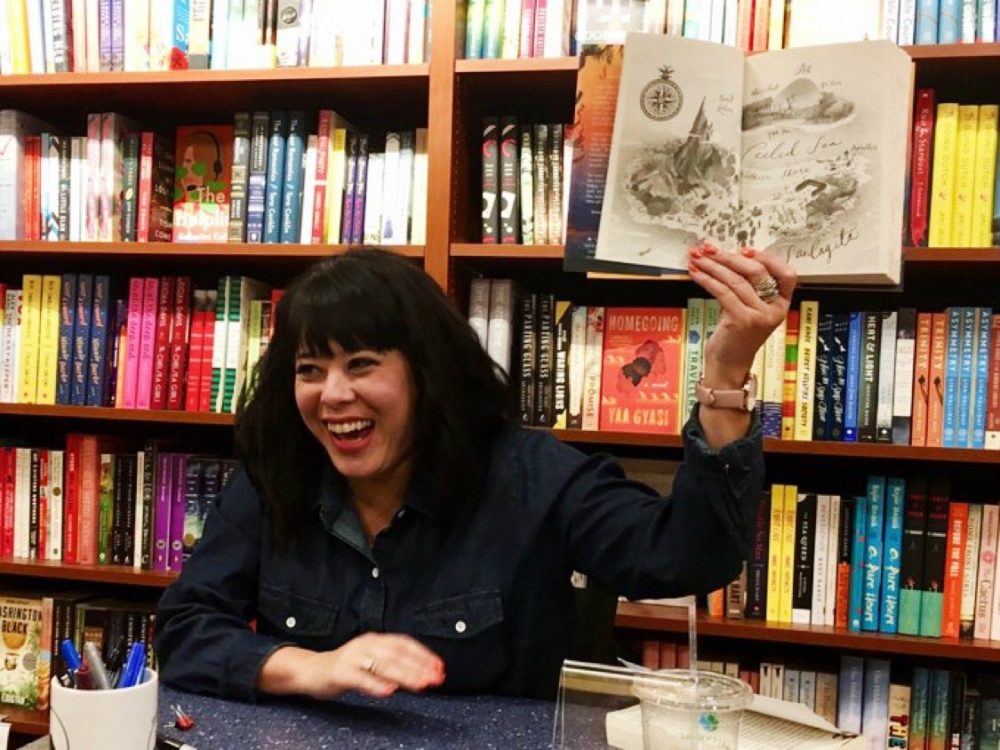
Editor’s note: Erin Entrada Kelly has been a writer for as long as she can remember — as a kid she'd save up to buy copies of the Writer’s Market from her local bookstore. She writes all of her work longhand, in notebooks, before transferring even a sentence to the computer.
Entrada Kelly is the author of five novels for middle grade readers (her sixth,“We Dream Of Space,” is forthcoming in May 2020). In 2018, she won the Newbery Medal for her third book “Hello, Universe,” which Netflix is producing as a film of the same name. “Lalani of the Distant Sea,” out this fall, is her first contribution to the fantasy genre, and has its origins -- perhaps surprisingly — in the 2016 election.
A Filipino American, Entrada Kelly grew up in Louisiana, and has retained her southern drawl, even though she now resides in Greater Philadelphia. Prior to launching her career as an author, Entrada Kelly was a newspaper reporter and a magazine editor — and until publishing her third book, she worked full time as a corporate copyeditor. She's an unabashed Hufflepuff and says Judy Blume was her childhood hero.
In a conversation with Cognoscenti, Entrada Kelly talked about her creative process, where she gets her ideas and why she writes for middle grade readers. She will deliver the Kids’ Keynote at the Boston Book Festival on Sunday, October 20 from 12:00 - 1:00 p.m. at the Dewitt Center Gym (122 Dewitt Dr., Boston, MA, 02120). You can learn more about the Festival at www.bostonbookfest.org.
This conversation has been edited and condensed for clarity.
Cognoscenti: Reading your work reminded me that kids see magic all around them, and that they find even tiny things, like squirrels and rocks, endlessly fascinating. Sometimes, as adults (and parents, frankly) we ignore that magic or try to hustle it along, I think because we’re in a rush to get stuff done. How do you stay in touch with that magic?
Erin Entrada Kelly: I spend a lot of time in schools. Little kids, like third graders, can’t wait to talk to me. They always run up after a presentation to give me a hug — they have this sense of wonderment about everything. But there’s a shift that happens in the late tween years, around 7th-8th-9th grade, where the qualities that are endearing in a younger kid (say, a girl who likes to be in charge), just aren’t anymore. Instead kids, and especially girls I think, get really focused on thinking about what they’re supposed to be doing and on what their peers think of them. One of the things that gets lost in the transition from childhood is that innate curiosity and the willingness to fully embrace what makes you different. I think it’s one of the tragedies of growing up.
Advertisement
Cog: Is that why you write for middle grade readers? Because those kids are still open and free and curious?
EEK: Yes. That’s absolutely why. These kids are just on the cusp. They’re grappling with big problems, but they still have the sense of wonderment and charm and hope. It’s a sweet spot to talk to them about all the challenges they might face in the world, but also to make sure they know how their spirit and imagination can help to carry them through.
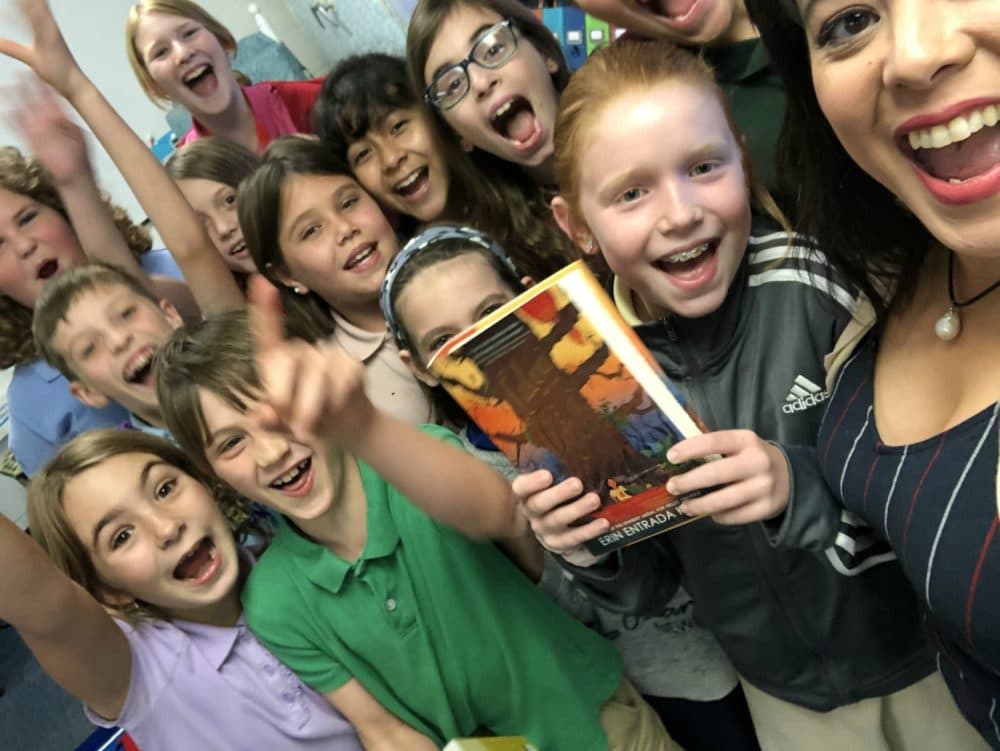
- The author at a book talk in September 2019 at the Center for Inquiry in Indianapolis, IN. (Courtesy)
Cog: Is that one of the messages you want kids to take from reading your work?
EEK: The big thing I try to get across in my books is that you don’t have to change to be better. So, in “Hello, Universe,” Virgil’s parents really want him to come out of his shell, because they feel like he’s too shy. And I want us to ask the question, “why can’t he just be shy?” Being true to who you are and being the best version of yourself is the key.
Cog: What about the adults who may be reading your books with the kids in their lives? What do you hope they take from reading your work?
EEK: I think as we get older, we become naive about childhood, and we forget just how difficult growing up is. We downplay the problems of young people — it’s astonishing, really. If childhood is so easy, why are so many people in therapy trying to overcome theirs?! Our childhoods inform everything about us — the course of our lives, what we believe, what we stand for and how we think. But when we look back on it as adults we have like a nostalgic remembrance of it and we forget how difficult it is.
Cog: In your lovely Newbery Medal acceptance speech you said, “My greatest wish as a writer is that the person reading my book — or any book, for that matter — feels less alone.” On the same page where I read that speech, there’s a picture of you hugging a little girl, who looks like she could have Filipino heritage. I wonder if representation has always been one of your goals as a writer?
EEK: I’ve been writing since I was a kid, and back then, the characters in my stories were a lot like Elizabeth and Jessica Wakefield, the “Sweet Valley High” twins. It didn’t occur to me that my experience as a Filipino American in Louisiana would be interesting to anybody in any way. But when I wrote my first book [“Blackbird Fly”], that was the thing agents and editors responded to the most.
Things are a whole lot better now, but historically, there have been so few stories about marginalized communities, and especially Filipino communities. For so long, I didn’t find any of my background interesting — as a kid I resented it, because I looked so different from everyone else, and my mom had an accent, and she sometimes ate with her hands and sometimes kids made fun of me. I want young people who are reading my books to not have to go through those feelings of resentment. I don’t want them to allow other people's opinions to influence how they feel about themselves.
Cog: If I’m doing the math right, you’ve published five books in five years. That seems extraordinarily fast! Is that just how you roll?
EEK: That’s how I roll! There are a few things that go into it. I write a lot in one sitting. I write fast, and I read fast, and I think some of that comes from the fact that I've been writing — pretty much nonstop — since I was a little kid. Some of it also comes from my background in journalism, where I had to write on a deadline. And I also just have a lot to say about growing up and society, and writing is my outlet for everything, and it always has been.
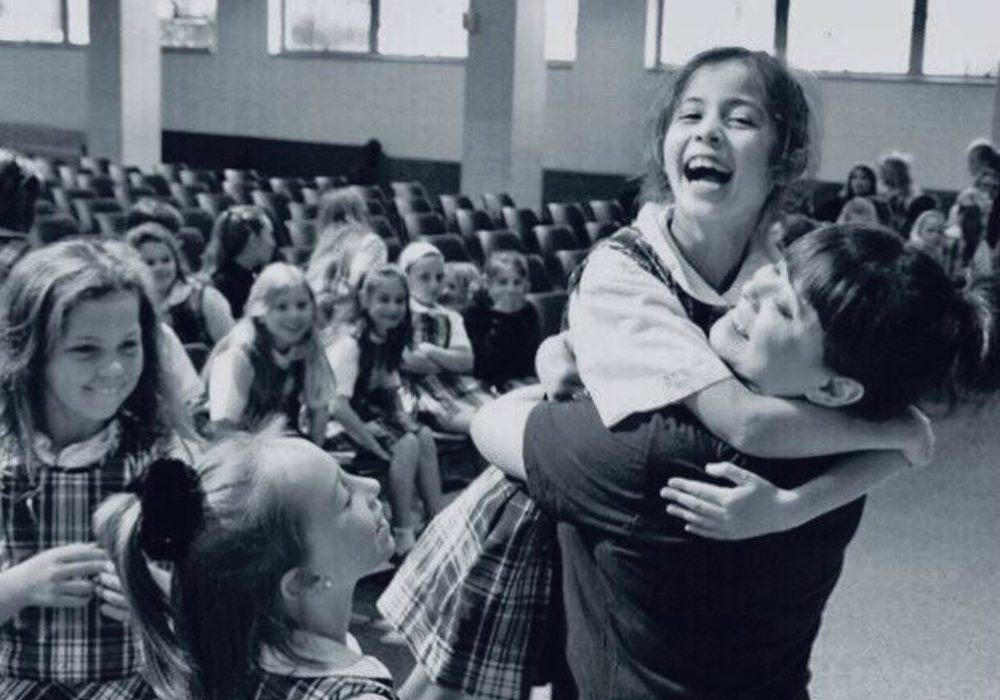
- Erin Entrada Kelly embraces a young student at a school in New Orleans. She was visiting the school while on tour for her fourth book, "You Go First," a book about friendship, bullying and growing up. (Sacred Heart Academy, New Orleans)
Cog: So how much do you write a day when you’re really in the thick of a project?
EEK: I started reading books on craft when when I was really young, like in middle school, when I barely understood what the books were saying. One thing I learned from all those craft books, is that everyone will tell you about their process — whether it’s keeping a schedule, waking up at 5 a.m., writing 100 words every time you sit down. I’ve tried all those things over the years, but you have to figure out your own process. My way is not to have any schedule at all.
Cog: Is it true that you write all your first drafts in notebook?
EEK: I do. I write all my first drafts by hand. But I spend months and months writing and plotting in my head before I write anything down, because once I put it on paper, I think it becomes something else. In my notebook, I’ll list out all the characters and what kind of people they are, then I do a synopsis and a rough outline of what’s going to happen. Once I feel like I have roadmap, I’ll start writing — and I’ll generally take it from the first draft in my notebook to the computer.
Cog: And what happens after a book is put to bed?
EEK: I've learned that the best way to survive in publishing — emotionally and mentally — is to always be working on something else. Once a book is in copy edits and being put to bed, I’ve already started mentally building my next book in my head. I never go back and reread my books.
Lalani’s single greatest virtue is her compassion and empathy ... she’s brave because she is compassionate.
Cog: Your latest book, “Lalani of the Distant Sea,” is your first fantasy novel. Can you tell me about the origin of that book?
EEK: At the time of the presidential election in 2016, I was actually working on different book. But when Trump won, the world tilted on its axis in so many ways, and I didn’t feel connected to the manuscript I was working on anymore. I recently found the notebook where I first had the idea for Lalani — I’d written all this stuff, about being angry and sad about Trump. I wrote, “I know what I’m going to do: I’m going to write a book, and it may be a terrible book and it may get terrible reviews, but I at least I will have done something.”
Cog: Lalani is not a typical hero character. Can you tell me about her?
EEK: I wanted to write a book about ordinary people doing extraordinary things, about ordinary people evoking change. And these people — and Lalani specifically — aren’t the loudest or the bravest people in the room. Lalani’s single greatest virtue is her compassion and empathy. That fuels her more than anything else: she’s brave because she is compassionate. That’s something that isn’t always celebrated or revered in our society, especially since the 2016 election. I wanted to celebrate it, through the eyes of a girl who was brown, who was small and pretty ordinary.
Cog: The book draws on Filipino folklore. Why did you decide to write it as a fantasy? Did it feel more natural to the story?
EEK: There are so many things I wanted to explore — toxic masculinity, gender stereotypes, expectations, who has power and why. All that stuff. Fantasy and science fiction are unique in the sense that they're inherently social most of the time — you're building a society in order to demonstrate ideals or questions that you can't explore in realistic fiction, because you're shackled by people's real world expectations. In this case, it allowed me to show patriarchy and stereotyping in a bare bones way, because the existence of those things in our society is often incredibly subtle. I used Filipino folklore not as a direct interpretation, but more of an inspiration.
Cog: Can you give us a sneak peek of the book coming out in May 2020? Are you allowed to talk about that?
EEK: Yes! It’s called “We Dream Of Space” and it’s centered around the Challenger disaster. The whole story takes place in the month of January 1986, and focuses on three siblings in Delaware, who are all struggling with different aspects of middle school life. The primary character is a girl, named Bird, and her dream is to become the first female shuttle commander for NASA. The book isn't necessarily about the launch — it's about family and siblings and hopes and dreams — but the launch is definitely a thread throughout the narrative.
I remember the launch vividly [she was a fourth grader at the time]. I can remember the build up and excitement around the launch, and about space in general, and then what happened was so pivotal to a lot of people's childhoods. People don't realize this, but very few adults actually saw the tragedy live, because they were at work and CNN, which was barely a novelty at the time, was the only channel that carried the entire launch. NASA broadcast it into classrooms, so children saw it over and over, 'til it burned in their brains. But kids today don't even seem to know what it is, which is so sad.
Cog: What about your keynote at the Boston Book Festival? Can you give us a preview?
EEK: I’ll talk about the inspiration of Lalani, though not necessarily about the election stuff we've talked about. More the idea that I wanted little Erin — young me — to be able to be a hero in a book. When I was a kid, I absolutely did not see myself as any kind of hero. I thought I was pretty much like the weakest link of any group, because I was so sensitive, and everything made me cry and I didn't want to hurt anyone's feelings. My sensitivity felt like a liability when I was growing up — it didn’t feel like a strength, it made me feel weak. Now, as an adult, and especially with all the craziness going on around us, I know that my sensitivity, my empathy, is an asset.
Cog: You’ve described yourself as a quiet, sensitive kid, sort of an outsider, someone who was bullied. But you always had this interest in writing — and you wanted, from a really young age, to make your work public. That’s gutsy. You must have had something you wanted to say.
EEK: This is going to sound overly dramatic, but I think it was more about survival than anything else. Whenever I got depressed or sad or lonely — which was often — the way I would escape mentally and emotionally, was to think about the day when I'd be able to write books and share them with people and be just like Judy Blume, who was my hero. There’s a chapter in “Hello, Universe” called “Imagine You Are Somewhere Else,” and this feeling, that I had no other choice but to accomplish my dream, is where that comes from. In that Newbery speech, I said, “I reached for that dream like a security blanket. I wrapped it around my shoulders and used it for warmth,” and that’s really it.
Cog: So, have you ever met Judy Blume?
EEK: No, but she did tweet at me once! We should meet because I talk about her all the time, and I am a total fan girl.
Cog: It seems like that should absolutely happen. Judy Blume, if you're reading ... If you ever did meet, what do you think you'd talk about? What would you ask her?
EEK: Honestly, I would just say thank you, even though I’m sure she’s heard that a zillion times. I felt like she really understood what it was like to be me. She put all the secrets nobody talks about into a book: bra sizes and periods and friendship dynamics. All those things that are scary to young people — that they didn’t talk about and that no one talked to them about — were right there on the page, which is what’s so incredible about books anyway. So, I’d say thank you. And then I’d say, “Can we please take a selfie?”
